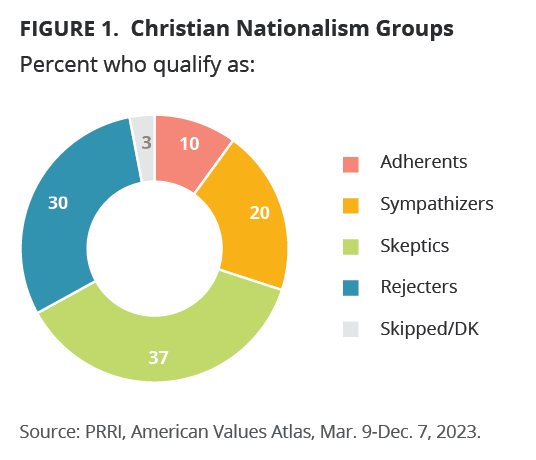The Freedom From Religion Foundation welcomes the recent findings that approximately two-thirds of Americans do not support Christian nationalism.
It’s truly good news that 57 percent of Americans “completely disagree” that U.S. laws should be based on Christian values, two-thirds completely disagree that being Christian is an important part of being truly American, 70 percent completely disagree that the U.S. government should declare America a Christian nation, 60 percent that we would not have a country anymore if the “U.S. moves away from our Christian foundations” and three-quarters that “God has called Christians to exercise dominion over all areas of American society.”
The Public Religion Research Institute surveyed 22,000 adults throughout last year as part of its American Values Atlas and was able for the first time to research attitudes on Christian nationalism in all 50 states. The research finds that roughly three in 10 Americans qualify as adherents (10 percent) or sympathizers (20 percent) of Christian nationalism while 30 percent reject it and 37 percent are skeptical. These percentages are consistent with responses since PRRI started asking these questions in late 2022.
Notably, if not surprisingly, the group with the most bragging rights for agreeing least with Christian nationalism is the religiously unaffiliated: 61 percent reject it and 31 percent are skeptical. Jewish Americans are second-least supportive, followed by religious non-Christians.
Also not surprisingly, majorities of white evangelical Protestants and other Protestants of color fall into the Christian nationalist camp, with a near-majority of Hispanic Protestants close behind. However, it’s heartening that majorities of Mormons, Black Protestants, other Christians, white mainline Protestants, white Catholics and white Hispanics reject or are skeptical of Christian nationalism.
Among other significant findings:
- “Residents of red states are significantly more likely than those in blue states to hold Christian nationalist beliefs.” In red states, the number of Christian nationalist leaners is nearly four in 10. In five states, more than 45 percent of residents are Christian nationalist adherents or sympathizers: North Dakota, Mississippi, Alabama, West Virginia and Louisiana.
- “At the national level, Christian nationalism is strongly linked to Republican Party affiliation and holding favorable views of Trump.” Republicans at 55 percent are twice as likely as independents and three times as likely as Democrats to hold such views.
- “Christian nationalism is strongly linked to evangelical/born-again identity and frequent church attendance.” Majorities of white evangelical Protestants and Hispanic Protestants hold Christian nationalist beliefs. Christian nationalists are more likely to believe in modern-day prophecy, spiritual healing and the prosperity gospel. Of those who attend religious services weekly or more, 52 percent are Christian nationalist adherents or sympathizers, compared with 38 percent who attend a few times a year and 18 percent who seldom or never attend.
- “Christian nationalists are more likely than other Americans to see political struggles through the apocalyptic lens of revolution and to support political violence.” Some of the disturbing findings are that a majority of Christian nationalist adherents and sympathizers agree that “there is a storm coming soon that will sweep away the elites in power and restore the rightful leaders.” They are about twice as likely as other Americans to believe political violence may be justified.
- “While there is little variation in support for Christian nationalist beliefs by race or ethnicity alone, Christian nationalist beliefs are refracted through racial and ethnic identity, which produces divergent political outcomes among white, Hispanic and Black Americans.” For example, among white Americans and Hispanic Americans — but not Black Americans — holding Christian nationalist beliefs is strongly correlated with Republican Party identity and support for Trump, according to PRRI.
The research is a follow-up from the major national survey PRRI released a year ago. As FFRF observed last year when that study came out, this is generally reassuring news for secularism. PRRI gauges Christian nationalist leanings based on adherence to the following statements:
- The U.S. government should declare America a Christian nation.
- U.S. laws should be based on Christian values.
- If the United States moves away from our Christian foundations, we will not have a country anymore.
- Being Christian is an important part of being truly American.
- God has called Christians to exercise dominion over all areas of American society.
“This survey generally speaks well of the American people’s commitment to pluralistic values,” maintains FFRF Co-President Annie Laurie Gaylor. “But let’s remember the caveat by Katherine Stewart in the new documentary, ‘God and Country,’ who points out that in a country where 40 to 50 percent of the people don’t vote, you don’t need a majority to dominate an election cycle.”
That’s why it’s so important that nonbelievers and other “Nones” get out the vote. The “Nones,” at 28 percent of the population, could cancel out the vote of Christian nationalists.
The Freedom From Religion Foundation is a national nonprofit organization with over 40,000 members and several chapters across the country. Our purposes are to protect the constitutional principle of separation between state and church, and to educate the public on matters relating to nontheism.


